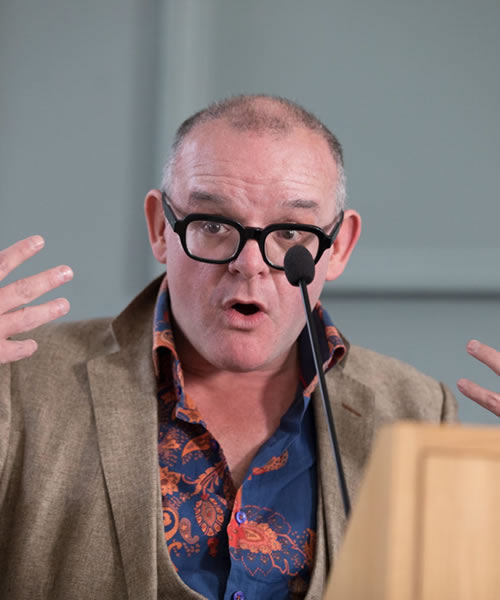When it comes to matters of religion—and it often does—the horror genre tends to be a true believer, a traditionalist, an ultra conservative, a fundamentalist. Hearkening back to the tradition of Enlightenment theology that derives from John Toland and others, for horror, Christianity is definitely mysterious. It refuses to believe in the Weberian Entzauberung, the “disenchantment of the world.” It exposes the follies and limitations of scientific naturalism and rational materialism as worldviews. It holds up religious modernism as empty secularism. While mainstream or institutional theology has sometimes tended to steer clear of theodicy (perhaps because it asks difficult or troubling questions which can only be answered unsatisfyingly, or evasively), horror knows that the Devil is real, an active agent of radical evil who wants your soul, or the body of your child—as films from The Exorcist (1973) to Hereditary (2018) make very clear.
Hereditary, though, is an atypical case. To begin with, its understanding of demonology, and particularly of demonological orders and hierarchies, is unusually literal-minded. The film draws its inspiration from The Lesser Key of Solomon, a seventeenth-century grimoire well known in occult circles at least since its translation by Samuel Liddell Mathers MacGregor, ipsissimus of the Hermetic Order of the Golden Dawn, and which contains a taxonomy of 72 demon kings and nobles. Although Hereditary’s gender politics are not straightforward, the film’s occultists believe that King Paimon, the demon lord who they serve, requires a male host in order to manifest himself in human form (all of the Lesser Key’s demons are in fact male). Charlie, the young girl who Paimon initially possesses, turns out to be an expendable corpus vile. It is her brother, Peter, whom the demon really wants.
Hereditary is also unusual in that it seems to have nothing to say about (or to) Christianity. Generally, modern horror is full of troubled and ambivalent priests. These are often Catholic priests, unsure of their vocations and destabilized by modernism, most notably by Vatican II and its policy of aggiornamento (“bringing up to date”). Anxieties about the modernizing tendency in Catholicism in the wake of Vatican II, and articulations of resistance to a perceived secularization and desacralization, are to be found in a series of very high-profile and highly successful works of horror across the 1970s, as embodied, for example, by Father Karras in The Exorcist, Father Callahan in Salem’s Lot, or Father Mancuso in The Amityville Horror, for all of whom religious modernism is inadequate to the task of combating evil. Sometimes, these works of horror attempted to re-emphasize traditional forms of authority vested in the Church and its priests. The Tridentine Mass, an early and significant casualty of Vatican II, maintains a powerful grip on the popular cultural imagination through these works of Catholic horror, in which it is a major weapon against Satan, and one which, clearly, the Church should never have abandoned.
A pop-cultural re-emphasizing of traditional Christian authority also meant a re-emphasizing of traditional gender roles and relations, sometimes punitively enforced. It is no accident that a major wave of Satanic horror, beginning with the publication of Ira Levin’s Rosemary’s Baby in 1967, and the release of Roman Polanski’s film version the following year, should coincide with the rise of Anglo-American Second Wave Feminism, and particularly its manifestation in the Women’s Liberation Movement (from Rosemary’s Baby and The Stepford Wives to The Exorcist and Carrie, American horror is full of anxious responses to women’s liberation). As anyone who paid attention to the Brett Kavanaugh case will know, the fundamental battles of religion and society are often fought over (and on) women’s bodies. Horror serves to literalize this, and sometimes its messages are complex.
Unlike Levin’s novel, Polanski’s Rosemary’s Baby is very largely a secular film, in which (like Hereditary) Christianity plays virtually no part. Rather, it is a film about men controlling women’s bodies. Rosemary’s husband Guy colludes with the eminent obstetrician Dr. Sapirstein, also a Satanist, to prolong the extreme pains Rosemary feels through most of her pregnancy. Most disturbingly, his colleague, the entirely secular Dr. Hill, placates the terrified Rosemary and willingly hands her back to her tormentors, Guy and Sapirstein. Hill is no Satanist, just as the conspiracy to control Rosemary’s body is not entirely Satanic.
Georgetown alumnus William Peter Blatty dedicated The Exorcist “To the Jesuits, for teaching me to think”; William Friedkin’s film, set around Georgetown, features a number of prominent Jesuits essentially playing themselves. The film plays out as a struggle for control of an adolescent girl’s body, as Regan MacNeil’s flesh is scored, disfigured, and literally written on by the theological combatants, while their medical counterparts perform incredibly invasive angiogram probes. It is difficult to know which is worse.

